The Ceremony Of Innocence
By John McDaid | Wednesday, 1 January 2020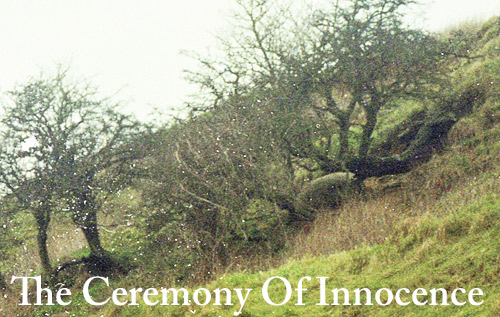
by John G. McDaid
"Turning and turning in the widening gyre
The falcon cannot hear the falconer."
–William Butler Yeats

by John G. McDaid
"Turning and turning in the widening gyre
The falcon cannot hear the falconer."
–William Butler Yeats
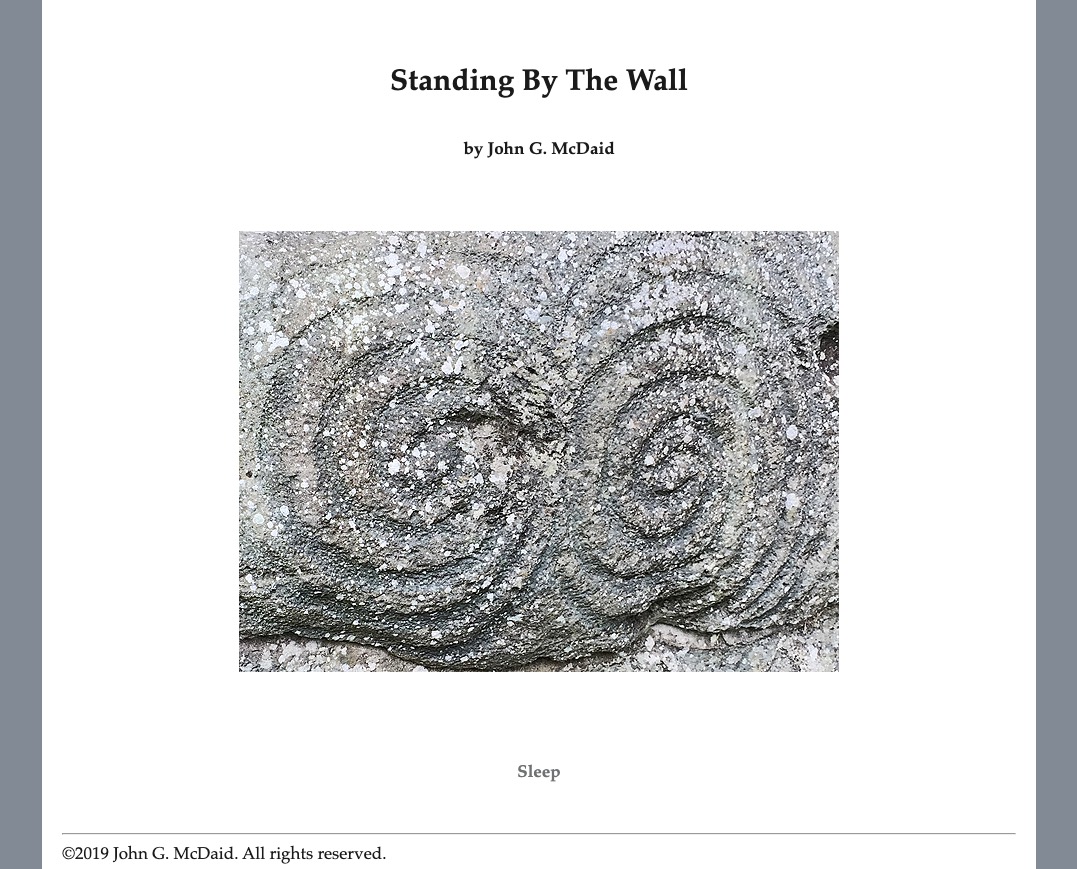 Written for the Association for Computing Machinery Hypertext 2019 "48-Hour Hypertext Challenge" (took about 30 hours), this work was displayed as part of the exhibition at the conference in Hof, Germany. You can read it at Eastgate.com.
Written for the Association for Computing Machinery Hypertext 2019 "48-Hour Hypertext Challenge" (took about 30 hours), this work was displayed as part of the exhibition at the conference in Hof, Germany. You can read it at Eastgate.com.
.
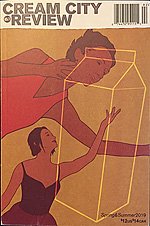 My latest story, a print/Interactive hybrid science fiction short just appeared in Cream City Review #43.1 and its online companion, I/O. You can read for free at the I/O site.
My latest story, a print/Interactive hybrid science fiction short just appeared in Cream City Review #43.1 and its online companion, I/O. You can read for free at the I/O site.
.
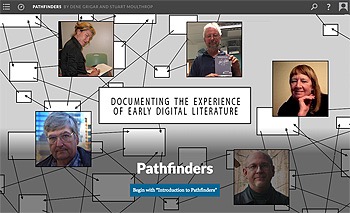 Portsmouth science fiction writer John McDaid's 1993 hypermedia novel "Uncle Buddy's Phantom Funhouse" is one of four examples of early digital literature included in a just-released scholarly resource called "Pathfinders," which aims to preserve and explore these innovative electronic fictions. Electronic Literature Organization president Dene Grigar and board member Stuart Moulthrop were co-principal investigators on this National Endowment for the Humanities funded effort to make these works available to a broader audience. Here's their announcement:
Portsmouth science fiction writer John McDaid's 1993 hypermedia novel "Uncle Buddy's Phantom Funhouse" is one of four examples of early digital literature included in a just-released scholarly resource called "Pathfinders," which aims to preserve and explore these innovative electronic fictions. Electronic Literature Organization president Dene Grigar and board member Stuart Moulthrop were co-principal investigators on this National Endowment for the Humanities funded effort to make these works available to a broader audience. Here's their announcement:
In the decade between 1985 and 1995, as personal computers grew familiar and the Internet became a presence in everyday life, assumptions about reading, writing, and text began to change. Digital tools allowed increasingly powerful combinations of media. The ancestors of blogs and social networks appeared. Experimental writers began to use tools like hypertext as the basis for fiction and poetry.
In the face of all these changes, the idea of the book remained essential in understanding the new nature of writing. Yet the book could no longer be limited to traditional forms. To understand the early history of electronic writing we would need a new kind of book; but what would it be like? How would it capture the interactivity the effort now required of readers? How would it reflect the graphics, movement, and sound that that had become important narrative strategies? How would such a reinvented book make accessible works meant to run on an Apple IIe or early Macintosh computer, in these days of tablets and smart phones?
Pathfinders: Documenting the Experience of Early Digital Literature, by Dene Grigar and Stuart Moulthrop, answers these questions in the form of a multimedia, open-source web-book created for a wide array of digital devices. It features 173 screens of content, 53,857 words of text, 104 videos, 203 color photos, and various audio files, providing readers with access to four important computer-based works of literature that were among the first to be sold commercially in the U.S. — but are now seriously threatened by obsolescence.
The book, whose production was funded by a grant from the National Endowment for the Humanities, will be released June 1, 2015 and made available free of charge through the open-source platform Scalar, created by the Alliance for Networking Visual Culture at the University of Southern California.
Using video and still photography, Pathfinders captures demonstrations of four groundbreaking works, performed by their authors on vintage systems. Readers accessing the book will watch Judy Malloy walk through her database novel Uncle Roger, originally published on the Whole Earth ‘Lectronic Link and considered by some the first example of social-media literature. They will also see a tour of Uncle Buddy’s Phantom Funhouse, a revolutionary hypermedia novel-in-a-box by John McDaid, and a demonstration of two classics in the early hypertext system Storyspace, Shelley Jackson’s Patchwork Girl and William Bly’s We Descend. Extensive interviews with all four authors add an important dimension of oral history to the project.
All four are acclaimed works of fiction representing the cultural impact of digital technologies that resonate today in experimental writing, video games, cinema, and virtual reality experiences.
Pathfinders was created by Dene Grigar, Professor and Director of the Creative Media & Digital Culture Program at Washington State University Vancouver, and Stuart Moulthrop, Professor of English at the University of Wisconsin-Milwaukee. Demonstrations and research took place in the Electronic Literature Lab (ELL), a working collection of electronic literature and vintage computers dating from1983 assembled and directed by Grigar. The designer of the Pathfindersbook is Will Luers, faculty member in the CMDC Program. Madeleine Brookman, a junior in the CMDC Program, served as the Research Assistant to the project.
The formal book launch party is scheduled for Friday, June 5, at 6:30 p.m. at Nouspace-Angst Gallery, located at 1015 Main Street, Vancouver, WA. The works of these authors will be displayed on vintage computers and copies of the book will be on view to the public. For more information, contact Dr. Dene Grigar, dgrigar at wsu.edu.
The book will be available at http://scalar.usc.edu/works/pathfinders.
Editorial note: Written from a press release.
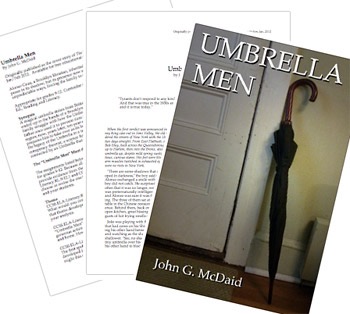 I was delighted to take part yesterday in a workshop with local authors and teachers on writing and the Common Core State Standards sponsored by the East Bay Educational Collaborative and the Association of Rhode Island Authors (ARIA). As part of the preparation for that workshop, Karen (who has her M.S. Ed. in Reading and Literacy) put together a study guide for high school teachers for my most recent short story, "Umbrella Men," with assignments aligned to the CCSS. I showed the materials to teachers at the workshop and got some good feedback.
I was delighted to take part yesterday in a workshop with local authors and teachers on writing and the Common Core State Standards sponsored by the East Bay Educational Collaborative and the Association of Rhode Island Authors (ARIA). As part of the preparation for that workshop, Karen (who has her M.S. Ed. in Reading and Literacy) put together a study guide for high school teachers for my most recent short story, "Umbrella Men," with assignments aligned to the CCSS. I showed the materials to teachers at the workshop and got some good feedback.
To try to make this a helpful package for educators, I've created a printable PDF of the story with line numbers to facilitate reference, and a educator's epub version to make it easy to download and read (which could also be used by students, if you don't care about the numbering.)
It's all available for free under a Creative Commons license over on a new page for educational materials. If you're an educator, and have any questions, please feel free to contact me.
Oh, and if you want a chance to meet some of Rhode Island's great local writers and check out their work, ARIA hosting the second annual Authors Expo on November 8 — more info on the web site.

Teachers may freely download all material on this page for classroom use. This work is licensed under a Creative Commons Attribution-NonCommercial 4.0 International License.
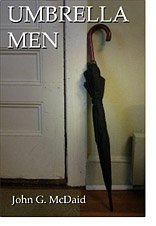 Umbrella Men
Umbrella Men
Originally published as the cover story of The Magazine of Fantasy & Science Fiction, Jan/Feb 2012.
Alonso Caua, a Brooklyn librarian, inherited an ancient, magic umbrella that spreads peace in its shadow, but its presence now seems to be changing his 10-year-old son in unpredictable ways.
Curricular materials developed by Karen McDaid, M.S. Ed., Reading and Literacy.
Appropriate for grades 9-12
Lexile score: 980
Interests: science fiction, secret history, urban fantasy, contemporary fantasy, conspiracy theories, secret societies, New York City, Brooklyn
Note: The version of the story included on this page has several minor editorial changes from the published version to make it appropriate for a student audience.
Downloads
Full text (with line numbers) — 120K printable PDF
Study guide aligned to Common Core State Standards — 70K PDF
Teacher e-book review version (no line numbers) — 390K epub

|
| Thomas Pynchon (photo: a friend) |
In case you've forgotten (and how easy it is to forget, eh, folks like us who spend all our time at the movies) tomorrow is the birthday of pre-eminent American author Thomas Pynchon, and many of like mind (though what it is that mind is "like," exactly, few can say) opt to celebrate by wearing their affection on their sleeves, slid out of bookbags, unearthed from under a scumble of desktop detritus, on t-shirts, pie crusts, animated gifs, stickers, post horns surreptitiously chalked on girders to be hoisted skyward, retro-hip dayglo posters, skin art, nanofabricated movies starring individual atoms of Carbon (heh-heh, 6 protons, 6 neutrons, 6 electrons, I guess we all know what that means, eh?), or, even, the transgressive act of carrying the Rainbow in public...
More info on the reclusive but erudite web site Pynchon in Public Day.
Now, everybody...
This story appeared in the Jan/Feb 2012 issue of Fantasy & Science Fiction.
Umbrella Men
by John G. McDaid
"Tyrants don't respond to any kind of appeasement. Tyrants respond to toughness. And that was true in the 1930s and 1940s, when we failed to respond to tyranny, and it is true today."
—Condoleezza Rice, February, 2003